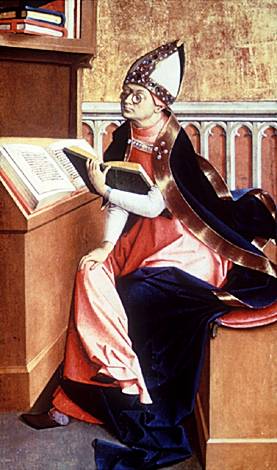I’m glad to see that my weekend quote of Dante stirred up some commentary. Here’s one, from Ben, followed by a response from me. (My apologies for Ben’s masculine language.)
I’m not sure how to understand Dante’s use of “free will” here but I’m
sure I don’t like Pinnock’s use of the term. I think there is some
confusion here and I think it would be helpful to define what we mean
by “will.” Clearly no man has the “free will” to fly, run faster than a
speeding bullet, etc because these things are not in his ability to do.
Mankind’s [sic] nature constrains him, even though he may want to do these
things. Furthermore, man [sic] only ever chooses that which he wants to do.
(The person injuring himself chooses bodily pain over emotional pain;
the person who eats collard greens probably values his health more than
an a food preference for a Snickers.) It is not anyone “constraining”
him to do these things, but HE IS BOUND by his own nature and desires.
So too, humans make real choices that entail real consequences, but
these are all constrained by nature, and thus are “free” in only a
limited sense.Now Paul says, humans are “by nature, children of wrath”
which means that it is our nature to oppose God, leaving us incapable
of doing good. But thanks be to God, that He does not leave us there!
By His grace, God intervenes in the world and lets “children of wrath”
do some good things. Furthermore, some He changes so radically that
they become people who have a nature that loves righteousness and doing
good. It’s like these people are born a 2nd time (John 3).
Thus, I’d
agree with Augustine, Luther, Calvin, and J. Edwards: man has a free
will to make real choices in this world, but that will is bound by
man’s “contagion”, by his indwelling sin-nature to oppose God. Thus no
man can choose God or Christ or love without God first acting on that
person’s heart to create in them a new desire, love and will. So if
someone defines “free will” as “ability to choose any option at any
time” then I would vigorously disagree, but I would affirm biblically
that man has “free will” – meaning he makes real choices in the world,
even as the Sovereign God guides all things by His eternal decree from
infinity past. I find no conflict in affirming that God has decreed all
things from eternity past and yet humans make real choices in this
world that they will be held accountable for.Brian, I would contend that the ideas of God being King (similar to a
Caesar – although holy, just, loving…) and being
different-from-mankind are biblical, not just from Greek philosophy,
etc.
Genesis 1 – God creates everything that is created and therefore
clearly is distinguished as the only being that is completely
self-sufficient.
Malachi 6:3 – “For I the Lord do not change; therefore you, O children
of Jacob are not consumed.”
Colossians 1:16 – “For by [Jesus] all things were created, in heaven
and on earth, visible and invisible, whether thrones or dominions or
rulers or authorities–all things were created through him and for him.”Also – is the line between “coercing” love and “inspiring” love clear
for you? Did my wife inspire my love, or could I not also say that she
even coerced my love? Not by physical force or manipulation of course,
but coercion by her beauty, love and charm? I suggest that God’s work
in a sinner MUST be one of radical wooing – even “coercion” if you want
to call it that – because otherwise His advances would only lead
mankind to be all-the-more disgusted with Him, just like Laura Winslow
so often became disgusted with the advances of Steve Urkel. The real
question is – back to the Original Sin discussion – does man have a
will that can simply be re-directed to God (as Laura finally chose
Urkel), or is it so diseased and God-opposed that it first needs a “new
birth” in order for the heart to love God and His commandments? For me,
the Bible clearly affirms the latter.TJ – I’m curious what was taught at PTS – do most teachers run in the
Reformed stream and affirm God’s sovereignty, man’s fallen nature, and
the primacy of God’s grace in salvation? Do most / many affirm the
libertarian form of free-will espoused by Pinnock (and possible Dante)?
Ben, the answer to your question is that it didn’t even come up, as far as I can remember. The Reformed vs. Open Theism debate (think Piper vs. Boyd in the 90s) didn’t even make the radar of mainline theologians. This debate is an exclusively evangelical debate, stemming from a literalistic hermeneutic that has to make sense of every phrase that seems to connote something about the nature of God.
The question of freewill was discussed a lot in my PhD seminars at Princeton, but always in the context of the sociological: structuralism vs. post-structuralism vs. rational actor theory. I’m a post-structuralist. And, no surprise, I think the Bible sets forth a post-structuralist account, too. In fact, I think much of what Jesus did was to upset the controlling structures and paradigms of his day.

